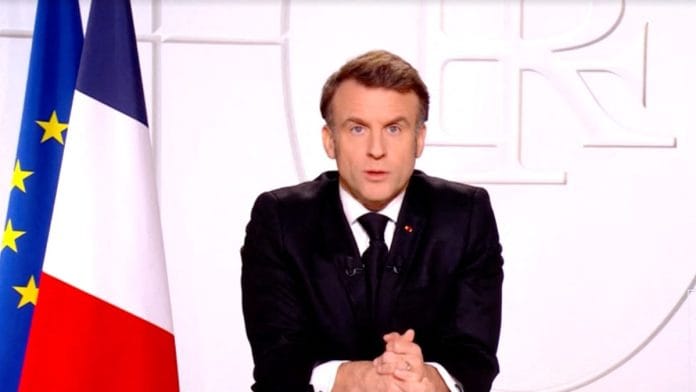New Delhi: French President Emmanuel Macron Wednesday said that Paris is willing to extend the protection afforded by its nuclear arsenal to its European allies, to protect them from the Russian threat as the US continues its retreat from the continent.
“Responding to the historic call of the future German Chancellor, I have decided to open the strategic debate on the protection of our allies on the European continent through our (nuclear) deterrence. Whatever happens, the decision has always been and will remain in the hands of the President of the Republic, head of the armed forces,” said Macron in a televised address late Wednesday evening. The original address was in French, the translation above was published by Reuters.
The French President added: “The future of Europe does not have to be decided in Washington or Moscow. And yes, the threat is returning to the East and the innocence, so to speak, of the last 30 years, since the fall of the Berlin Wall, is now over.”
Macron’s address came a day before the leaders are set to meet at an emergency European Council summit in Brussels to discuss the war in Ukraine and the defence of the continent. The offer to extend France’s nuclear umbrella to its European allies comes as the continent is dealing with US President Donald Trump’s retreat from the trans-Atlantic partnership.
France is the only nuclear weapons state that is a member of the European Union. On the continent, the only other Western nation with a nuclear arsenal is the UK, which left the EU in 2020.
The new US administration has continued to pressure Ukraine to come to the negotiating table with Russia, suspending all military aid and intelligence sharing activities with Kyiv. Furthermore, Washington has voted with Russia in the United Nations against European-backed resolutions condemning Moscow for the war in Ukraine. The Trump administration has also urged European nations to spend more on defence, as Washington looks to re-calibrate its military strategies towards other regions.
For many years, especially after the fall of the Berlin Wall in 1989, the European countries a part of the North Atlantic Treaty Organisation (NATO) have relied on the US’s security blanket. However, the churn by Trump has led to capitals across the European Union (EU) to rethink its security policies.
“I want to believe that the United States will stand by us. But we have to be ready if that is not the case,” said Macron during his Wednesday address.
The French President highlighted that Russia has become a threat for Europe in the years to come, and that it is time for European states to be “able to defend themselves better and deter any aggression.”
“We must equip ourselves better, raise our defence posture, and this for peace, even to deter. In this respect, we remain committed to NATO and our partnership with the United States of America. But we must do more. Strengthen our independence in defence and security matters,” said Macron.
Also read: ‘Reeks of double standards’—Economic Survey on EU’s new climate rules that will hit exports
Not the first time Macron’s raises defence
This is not the first time Macron has made such an offer. Back in 2020 the French President offered to develop a “strategic dialogue” over the role of Paris’s nuclear deterrence in ensuring European security.
Macron’s push for a stronger European defence architecture found no takers at the time. However, with Friedrich Merz, the likely next Chancellor of Germany, expected to take the reins in Berlin, discussions over expanding the nuclear umbrella are expected. Merz first brought up the idea of a collective UK-France nuclear protection for Germany last month, days before the elections in the European country.
An unreliable US and a Russian military on the move in Ukraine, have left European leaders scrambling to find a way to increase their defence capabilities.
European Commission President Ursula von der Leyen Tuesday announced the Commission’s proposal to mobilise EUR 800 billion in the next few years in defence expenditure across the European Union (EU) member-states.
The Commission’s proposal included a EUR 150 billion common defence fund, which could be accessed by member-states, while exempting defence investments from the bloc’s strict fiscal rules.
The goal is for member-states of the EU to increase their defence spending by 1.5 percent of their gross domestic product (GDP) in the next 4 years, which would see a total of EUR 650 billion mobilised.
(Edited by Zinnia Ray Chaudhuri)
Also read: EU pitches €800-bn plan to ‘ReArm Europe’ as Trump suspends military aid to Ukraine






